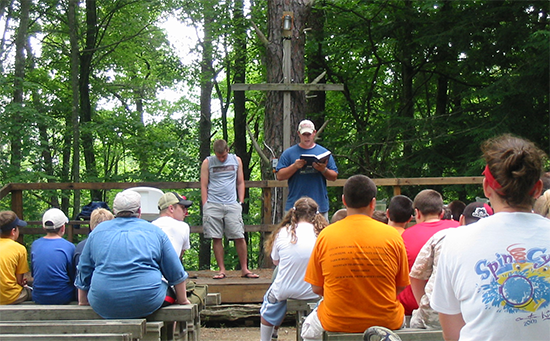
June-July 2016
Hidden Heroes
------------------
|






Called to Build: James and Dorothy Cox
By Bill and Brenda Evans
A sign on the door at 436 Main Street read, “Peace to all who enter here.” We rang the bell, and James Cox, sporting steel-rimmed glasses and a gray mustache, guided us to an elevator and up to his and Dorothy’s second-floor apartment in downtown Paintsville, Kentucky. In 1979, the couple began following a call God gave James, a layman, to change directions and build Camp Caleb Christian Camp and Conference Center in the Appalachian highlands of Kentucky. This interview is part of their story.
Evans: James, you mentioned a call to build. How did that come about?
James: My father had started a Chevrolet and Oldsmobile dealership in 1927. After his death in the early 1950s, I ran it. But by 1977, I knew I needed to do something else.
Dorothy: We were out in the backyard, and James told me, “God wants me to do something. I just don’t know what.”
James: So the Lord spent two years preparing me.
Evans: How was that?
James: I bought 400 acres for $15 an acre as an investment. The road was so rough and rutted we had to borrow a friend’s Jeep just to get back to see it. Later, the Lord helped us build a camp and conference center on 265 acres of that land.
Dorothy: Also, James was always involved in things—dealership school, the car business, director of the bank board, community organizations, the building committee at church. He had also built and operated a motel and restaurant in town. In 1979, Dr. J. D. O’Donnell was used to bring about the tipping point.
James: That year, He lived in the prophet’s room at our house while heading up Bethel Bible Institute. Dorothy and I taught some of the classes and made a lot of contacts because of him.
Dorothy: Then he set up a summer youth camp at Levi Jackson State Park and asked James to direct it. I said, “Lord, help us! James has never even been to camp.”
James: The first day was mass confusion. Even some of the cooks didn’t show up. I said, “Lord, if you’ll help me through the week, I’ll never do this again.” But before it was over, 25 kids had been saved, and the Lord had told me to build a camp. So, I laid everything else aside and began.
Dorothy: Our son Jim had left college, so he took on the dealership. Also, the Lord sent the Gil Johnson family to Paintsville for a job, and he and his wife took us to The Wilds in North Carolina, where we learned so much about how to build and run a camp and conference center.
Evans: What was your first step?
James: A master site plan. I hired the Woolpert Company of Dayton, Ohio, to do aerial photographs and elevation studies and draw up a master plan, locating cabins, bathhouses, a pool, dining hall/activities building, office, snack shop, sewage plant, lake, and playing fields.
Dorothy: By the fall of 1979, we also had selected a Scripture and purpose from Luke 2:52: grow as Christ did, mentally, physically, socially, and spiritually. Then we started traveling
to churches and conferences to present Camp Caleb and ask
for help.
James: I was 47, so I’d been around a while, but I knew I needed good people to work with me, so I asked the Lord to supply the people He wanted to be board members and advisors. I never asked anyone. Seven trustees and four advisors volunteered. Eventually we had ten trustees, a board president, vice-president, secretary, treasurer, and four advisors.
Evans: How did you get financial backing?
Dorothy: We asked. By early 1980, we were incorporated as a non-profit organization and by law had to work under someone for a year to secure our non-profit status. Dr. O’Donnell served in that role. As for finances, we used several plans. One was called Camos, a club for young people who gave $2 or more each month from their own money. For families and churches we had a check-o-matic plan, a $1,000 Club, a $100 Club, memorial giving, and monthly pledges.
James: So, the summer of 1980, we had camp at Levi Jackson State Park again.

Dorothy: Then in 1981, we had an “illegal camp,” as we now call it. We had built cabins and bathhouses at the camp, but no dining hall. So we rented a big tent, cut 55-gallon drums in half for grills, carried water for cooking from a spigot over the hill, and fed the kids under the tent. After camp was over, inspectors came and told James, “You know you can’t have camp here until the dining hall is done.” James’ only answer was, “I understand.”
James: In early 1982, we were ready to start the dining hall, so I wrote an appeal letter. I told them we had to have $5,000 or more every month to meet our bills. We also needed 2,600 eight-inch concrete blocks, 150 tons of gravel, 150 bags of mortar, and volunteer plumbers, concrete finishers, and common laborers. I asked for prayer, too.
At the very end I told them about a young lady who had sent us a gift of $1.10. I said I knew her and knew her gift was a sacrifice. Then I wrote, “If God speaks to your heart about giving time and money to the camp, please, please, don’t rebel against His calling.” It was hard. I don’t really know how we did it.
Dorothy: For the dining hall, we had a log and truss campaign where individuals “bought” a log or a truss for the building. We borrowed some, too, and had a great treasurer, Norman Preston. He and I would sit down every month and spread out the bills. I would make piles. One pile had to be paid now. The second could wait two weeks. The last could wait until next month. After I made the piles, he wrote the checks, so we made it.
Evans: You mentioned the dining hall a while back, was that the first thing you built?
James: No, we started with water, electricity, and a sewage system.
Dorothy: There was already a gas well on the property, which we had cleaned out, and it was great. Still is. Heats everything on campus.
James: We did the sewage plant ourselves. I figured a way to do it, and with some volunteers did the digging. It was a gravity flow system, so the pipes had to be laid at just the right level to keep everything moving. It was a huge project.
Dorothy: James is so smart, and he’s like a dog on a bone when he’s onto something.
James: Like Pookie. He was our Bassett Hound. Actually, God just gave me the gift because I wasn’t a builder.
Dorothy: At first, they dug with pick and shovel in almost solid rock. It was terrible. I took them sandwiches and water and felt so sorry for them.
James: Finally, one day a volunteer came with a backhoe, but we didn’t get finished. The owner sent word to keep it another day, then another, I think. Anyway, that backhoe sure beat pick and shovel. When the company delivered our 15,000-gallon tank, I had a spot picked out, but the crane dropped it, missing the spot. We worked so hard on that.
Dorothy: But you played some, too.
James: Oh, yeah! One day, it was just us men. We were hot and tired, and somebody said, “Let’s go swimming.” We all started running and tearing off our clothes. By the time we got to the lake, we were naked and clothes were flung everywhere. Estill Williams from Springfield, Ohio, was in that group. Such a good friend. The Lord sent us people like that. Course, there was Dorothy. I couldn’t have done it without her.
Dorothy: The Lord had told me, “You’re in this, too,” and so
I was.
Evans: When did you finish the work the Lord called you to at Camp Caleb?
James: I resigned as director in October 1989. I’d been there ten years. I always knew my call was to build the camp, not operate it. One day I was in the kitchen at the camp, and the Lord said, “You can go now.” I kept on as president of the board until the early 2000s, but Camp Caleb went on just fine without me. Still is. Ryan McKenzie, who came to our camp when he was young, is the current director.
Dorothy: You know, when the Lord calls you, He doesn’t give you the whole plan, just enough to start. You might give up if He gave you the whole thing at once. By the time the Lord had prepared us back in 1979, we were like Caleb, ready for the mountain where the Anakim were (Joshua 14). It was a difficult place, a place of giants, but the Lord gave it to us like He did Caleb. That’s why we called it Camp Caleb.
About the Writers: Bill Evans, former director of the Free Will Baptist Foundation, lives in Ashland, Kentucky, with his wife Brenda, a retired English teacher. They are proud grandparents of seven.
|
|

